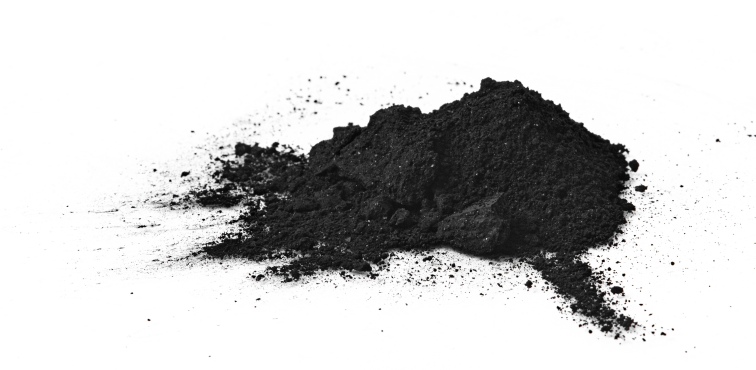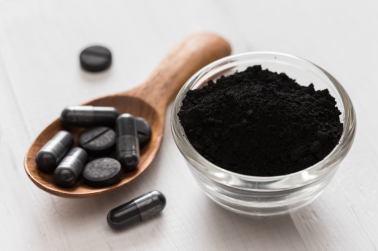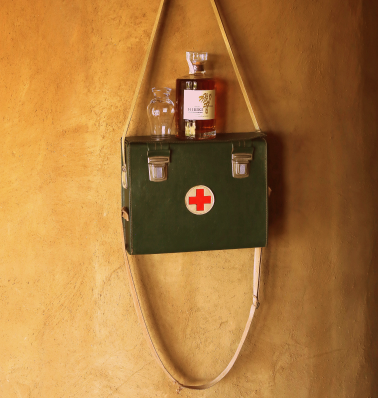Activated charcoal – a must-have for every home first-aid kit!
Is it still necessary to pump a person’s stomach?
When someone has been poisoned, many people think you have to get their stomach pumped – a belief that is often played out in dramatic movie scenes. However, this method to prevent toxin intake is now rarely used in Switzerland as the risk-benefit ratio is unfavourable.
Deliberately inducing vomiting has also not been recommended for many years. Instead, using activated charcoal can minimise toxin intake if it is consumed in good time. However, during our daily consultation we have noted that the average Swiss home first-aid kit does not include a bottle of activated charcoal suspension. In an emergency, easy access to one to two bottles of this black liquid in your home first-aid kit would be particularly helpful – especially for families with young children.
How does activated charcoal help in the event of poisoning?
In poisoning, activated charcoal acts like a sponge by absorbing the toxins in your stomach and intestine, preventing these from getting into your bloodstream and damaging your body. The toxins are excreted in the stool instead.
As activated charcoal (Carbo medicinalis) is a medicinal product, it should only be taken following consultation with a doctor or Tox Info Suisse. From 2019 to 2023, Tox Info Suisse recommended the administration of activated charcoal in response to about 2.5 % of enquiries that concerned people.
In an emergency do not hesitate to contact Tox Info Suisse!
Important information when using activated charcoal:
Only following consultation:
- Activated charcoal should never be taken without first consulting a doctor or Tox Info Suisse.
Not effective for every poison:
- Activated charcoal does not help with all poisons: for example, acids, alkalis, alcohols and metals do not bind to charcoal.
- However, activated charcoal does bind most medications and plant toxins.
The right time:
- Activated charcoal works best if it is taken quickly, ideally within an hour of being poisoned.
- In most cases of poisoning, taking it hours later does not help.
Contraindication – when activated charcoal should not be taken:
- Activated charcoal should not be given to people who are not fully conscious, who are suffering from severe drowsiness, a limited swallowing reflex or who are vomiting (danger of aspiration).
- Do not give it against the will of patients or children (danger of aspiration).
- Do not use in the case of suspected burns.
- Do not use with substances that do not bind to activated charcoal.
What is activated charcoal and how is it obtained?

Activated charcoal is a fine black powder that has no taste or odour.
It is generally administered as a ready-to-drink solution (suspension). Activated charcoal is produced from plant-based materials such as coconut shells. It is not the same as charcoal for barbecues although both products are made of carbon. Unlike barbecue coal, activated charcoal is activated in a special physical or chemical process, producing a porous structure. This greatly enlarges its surface area and thereby the ability to bind substances (adsorption) so that it can soak up toxins like a super sponge. Just a few grammes of activated charcoal have a surface area (adsorption area) that is roughly the size of a football pitch.
Why liquid activated charcoal and not capsules or tablets?
Tox Info Suisse recommends the ready-to-use, liquid activated charcoal (suspension) such as Carbovit® suspension. This is approved for use in Switzerland and contains 15 g activated charcoal per bottle of 100 ml fluid. It contains sorbitol, which is a sweetener used to improve the taste. This also has a laxative effect. To increase acceptance by children, the sweetened suspension with sorbitol can also be mixed with juice, cola or yoghurt.
The recommended dose is usually 1 g activated charcoal per kg body weight. A person weighing 60 kg therefore needs to take 4 bottles.

Activated charcoal capsules or tablets are not suitable for poisoning as they usually only contain small quantities of activated charcoal (about 200 mg per capsule).
The same person would need to swallow 300 capsules. However, activated charcoal tablets can be helpful in the case of traveller’s diarrhoea. Ideally, discuss taking this with your doctor’s practice.
Why does the ready-to-use suspension belong in your home first-aid kit, especially in a household with young children?
Activated charcoal works best if it is taken quickly, ideally within an hour of swallowing the poison. In our experience, emergencies rarely occur when shops are open and there is often no one readily available to provide you with activated charcoal quickly. These situations are always an exceptional circumstance. It is therefore useful to have a supply of activated charcoal – particularly in households with young children, who are frequently involved in emergencies related to poisoning. This enables quick and targeted treatment in an emergency. Bear in mind that it also takes time to drink the activated charcoal.

When should activated charcoal not be used?
The activated charcoal suspension should only be taken following consultation with a medical professional or Tox Info Suisse.
We advise against giving this product to people who are not fully conscious, who are extremely drowsy or who have a limited swallowing reflex. We also advise against giving this against the wishes of a child. If activated charcoal is given to patients in these situations, this poses the risk of activated charcoal accidentally reaching the windpipe or lungs, which can cause respiratory problems or inflammation of the lungs (danger of aspiration).
What are the side effects?
In principle, activated charcoal is considered to be safe; given proper application in an acute case of poisoning, the advantages far outweigh the disadvantages. Potential side effects are vomiting, constipation, a feeling of fullness, and black stools.
Care should be taken when taking activated charcoal with medication e.g. charcoal capsules for traveller’s diarrhoea, detox smoothies or detox products.

Charcoal capsules are often used for traveller’s diarrhoea and activated charcoal is also used in detox smoothies and other detox products that promise detoxification. However, the binding effect of activated charcoal relates to both toxic and non-toxic substances, irrespective of whether they have been taken in a therapeutic dose or in an overdose. For this reason, it can also reduce the efficacy of medication you rely on, such as the contraceptive pill.
Recommendation: Wait 2 to 3 hours after taking charcoal before taking other medication. In principle, any activated charcoal preparation should only be taken following consultation with a medical professional.
Further information
Medical literature
February 2025




